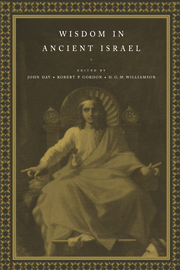Book contents
- Frontmatter
- Contents
- List of abbreviations
- Introduction
- Part 1 The ancient near eastern setting
- Part 2 Old Testament and Apocryphal texts
- 4 Foreign Semitic influence on the wisdom of Israel and its appropriation in the book of Proverbs
- 5 The limits of theodicy as a theme of the book of Job
- 6 Qoheleth
- 7 A house divided: wisdom in Old Testament narrative traditions
- 8 Wisdom in Solomonic historiography
- 9 Amos and wisdom
- 10 Hosea and the wisdom tradition: dependence and independence
- 11 Isaiah and the wise
- 12 Jeremiah and the wise
- 13 The wisdom psalms
- 14 Wisdom and Daniel
- 15 Ecclesiasticus: a tract for the times
- 16 The Christian use and the Jewish origins of the Wisdom of Solomon
- Part 3 Themes
- Biographical note: John Adney Emerton
- Bibliography of the works of John Adney Emerton
- Indexes
- Principal biblical and apocryphal references
16 - The Christian use and the Jewish origins of the Wisdom of Solomon
Published online by Cambridge University Press: 16 October 2009
- Frontmatter
- Contents
- List of abbreviations
- Introduction
- Part 1 The ancient near eastern setting
- Part 2 Old Testament and Apocryphal texts
- 4 Foreign Semitic influence on the wisdom of Israel and its appropriation in the book of Proverbs
- 5 The limits of theodicy as a theme of the book of Job
- 6 Qoheleth
- 7 A house divided: wisdom in Old Testament narrative traditions
- 8 Wisdom in Solomonic historiography
- 9 Amos and wisdom
- 10 Hosea and the wisdom tradition: dependence and independence
- 11 Isaiah and the wise
- 12 Jeremiah and the wise
- 13 The wisdom psalms
- 14 Wisdom and Daniel
- 15 Ecclesiasticus: a tract for the times
- 16 The Christian use and the Jewish origins of the Wisdom of Solomon
- Part 3 Themes
- Biographical note: John Adney Emerton
- Bibliography of the works of John Adney Emerton
- Indexes
- Principal biblical and apocryphal references
Summary
Not much is known of Wisdom as a Jewish book. Its earliest attestations are Christian, not Jewish; yet its content strongly suggests that it is a non-Christian Jewish work. Here clues to the Jewish origins and rôle of Wisdom are sought in the Christian witness to the book, and, less directly, in Jewish opinion as reflected in the Jewish inscriptions of Egypt.
Internal evidence suggests that Wisdom is a Greek compilation by a single writer, or by writers from the same school, who used more than one source; the work is consistent in its vocabulary and in its indebtedness to Greek thought, but exhibits contrasting changes of subject and style. Profound familiarity with an interpreted Bible is used in order to develop the specifically biblical literary tradition. The most likely place of origin is Egypt (section 3, below). Jerome claimed that (unlike Ecclesiasticus, which he knew in Hebrew) it existed ‘nowhere among the Hebrews’; ‘indeed’, he added, ‘the very style smells of Greek eloquence’. Originally Jews will have known Wisdom in Greek, and later probably in Latin too. Sources or versions now lost may have circulated in Hebrew or Aramaic; that a Hebrew text representing at least some part of Wisdom existed for a time seems likely on the general ground that the book had high standing among Jews at the time of Christian origins (see below).The Peshitta of Wisdom was probably known to some Jews in antiquity, as it was in the thirteenth century.
- Type
- Chapter
- Information
- Wisdom in Ancient Israel , pp. 182 - 196Publisher: Cambridge University PressPrint publication year: 1995
- 2
- Cited by

